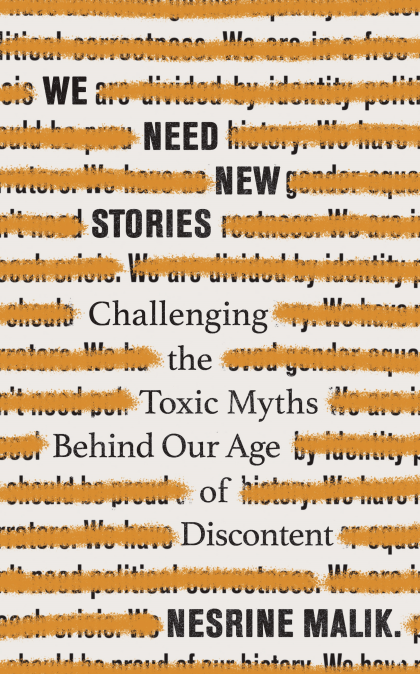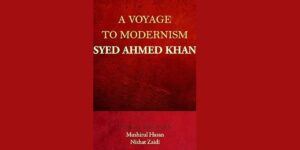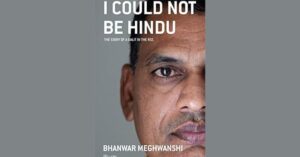We Need New Stories: Challenging the Toxic Myths Behind Our Age of Discontent
Nesrine Malik
Weidenfeld & Nicolson (2019)
298 Pages
Paperback
Rs. 799/-

The damaging identity politics myth creates an exception for whiteness, promotes racial entitlement via dog whistling (‘the wink’) and grievance flipping and is sustained by appeals to ‘universalism’.
Basically, there are two definitions of identity politics. The first is the effort to secure the rights denied to some on the basis of their identity—defensive identity politics. The second is that which seeks domination on the basis of identity—aggressive identity politics. Aggressive identity politics espoused by the majority is thought to be ‘natural and benign’. And identity politics, as practised by the blacks, the Asians, the minorities and the disadvantaged, is thought to be ‘dangerous, indulgent and damaging’.
Exceptionalism
There is a discount applied to rowdy behaviour by those we see as our own. In Saudi Arabia, it was official policy never to use the words ‘terrorist’ or ‘terrorism’ when referring to religious insurgents waging war against the royal family for the past forty years. Perpetrators were referred to as ‘those who have lost their path’ or the ‘the lost ones’.
[Similarly the violence unleashed by the majority in India is seen to be natural and harmless. Even the liberals refuse to speak against it, secretly basking on the glory of their innate identity, a Hindu. There is nothing wrong in claiming the innate ownership of this Hindutva/Hindu coin. Study the results of the West Bengal Assembly Election. What was the issue? The pride of being non-Muslim, the appeasement of the Muslims by the ruling government, and the need for solidarity of the majority for their make-believe grievances.
Promises for better health care, better education facilities, and the creation of jobs were, of course, printed in manifestoes. But what have we seen at the campaign rallies, in the streets or on the screens? It’s a bizarre exhibition of majority chauvinism based on their singular religious identity. The whole election is fought based on aggressive identity politics].
Defensive identity politics is mistakenly seen as a disruptive influence that divides the electorate and has pushed the white voters into the embrace of the populists. But it is a response against the dominance and ubiquity of a white [majority] identity. As Hannah Arendt said, ‘if one is attacked as a Jew, one must defend oneself as a Jew’.
When you are attacked and threatened because of your identity, you respond in terms of your identity. [For instance, In Bengal a Muslim is denied home at posh apartments/ areas/ towns only because she is a Muslim. It is her in-born religious identity against which how can she fight? Have the elite Hindu liberals had a second to think over this negligible/ minor issue ever? It is a gross violation of human dignity and the perpetrators are not the village half-literate or illiterate Hindus. They are the champions of Bengali (Hindu) culture—exclusionary at its best.]
David Goodhart, the author of The Road to Somewhere, has cleared the clouds when he states, ‘To put it bluntly—most of us prefer our own kind’. This direct honesty about white racial loyalty [majority loyalty] is helpful in understanding how minorities are blamed for white [hindu] tribal behaviour.
American academic Mark Lilla in a 2016 op-ed for the New York Times asserts: ‘liberals should bear in mind that the first identity movement in American politics was the Ku Klux Klan, which still exists. Those who play identity games should be prepared to lose it.’ His warning about the damaging effects of identity politics exposes the very heart of the myth. He refuses to believe that white [hindu] identity politics came first and is aggressive, while identity politics by non-whites [non-hindus] came second and is defensive.
What the damaging identity politics myth is based on is the perception that political motivations of the powerful [majority] are rational and untinged by anything as base as furthering an identity agenda. [Slogans like ‘sab ka saath, sab ka bikash’ ‘atmanirvor bharot’ vie with ‘goli maro’, ‘khatom karo’. What is the single criterion to kill and to be killed? It is racial/ religious identity. Where is the class identity?]
Racial entitlement
The aggressive identity politics constantly harps on false economic anxiety. Multiple researches showed that it was not economic anxiety but prejudices about race, gender and immigration that animated support for Trump, whose tenure has been characterised by vicious racist and sexist dog whistling. And it hardly impacted his popularity among his base.
Trump voters had stronger feelings about the ostensibly declining status of America globally. Dominance at home and abroad meant sitting on top of the totem pole racially. His supporters were not just conservative; they were regressive in that they were strongly motivated by a need to freeze the status quo in of their white racial supremacy. They saw in him a saviour of their positions—positions based on race, gender and culture. They were delighted by their leader’s racist attacks on Muslims, Mexicans and immigrants.
There are broadly two responses when confronted with proof that white people acted in racial concert: the first is that it is a reaction to changing demographics and the encroachment of the ‘others’— ‘the browning of America’. The second is benign tribalism—‘people preferring their own’.
The phrases ‘legitimate concerns’, in the UK and ‘economic anxiety’ in the USA, are now memes, jokes, ironic comments and religious abuse targeting Muslims and ethnic minorities. A lot of economic anxiety seems to take place on public transport.
The Wink-it’s not race
The damaging identity politics myths is sustained by constant denials that race is an element in white politics, while dog whistling that it is. The white people will deny, in fact, will abhor and object in the strongest terms, that race has anything to do with American politics. The truth is that it is.
It is a trick, a wink that has a long and successful history. Steve Bannon, Trump’s former strategist in a speech at a French rally bursts: ‘Let them call you xenophobes. Let them call you racists. Let them call you nativists. Wear it as a badge of honour.’ Is it patriotism or tribalism?
In the UK, white entitlement arguments hide behind criticising ‘multiculturalism’. By making demands for the return of white spaces as legitimate critiques of the failure of multiculturalism, the issue is removed from race, its edges softened. It becomes how the new arrivals have not integrated and how there needs to be some common ground for a society to function without friction. ‘Multiculturalism has failed’ is the wink.
Let’s study a case. Generation Identity, a Pan European Identitarian movement, promotes the values of homeland, freedom and tradition through peaceful activism, political education, and community and cultural activities. They want to create ‘a meta political patriotic value base.’
These are all good things to be praised. But as the ruse unravels, the aims become more specific. The three core aims are to ‘stop the Islamisation of Europe, oppose globalization and reverse the Great Replacement’. That would be the ‘Great Replacement’ of the white indigenous population, one of the founding myths of far-right, neo-Nazi and white nationalist political movements. A disclaimer runs at the bottom of their political statement. The group ‘does not provide a platform for any kind of national-socialist or fascists groups or views’. Just a peaceful, non-fascist, non-Nazi, patriotic group, but one that campaigns to repatriate immigrants.
This method of gaslighting was continued in America. When Trump, a man with a long record of racist statements was asked by a journalist about his history of clear and explicit prejudice from blocking black tenants from his buildings to fanning flames of the Obama birther myth, he replied that he was ‘the least racist person you have ever met’.
White aggressive identity politics is maintained by nailing this implausibility. Its political agenda is to glorify national and racial purity and sell a guarantee of social status based on that racial purity. The goal, the sweet spot of this identity politics, is to achieve a state where a white person can believe that they are good, while also believing that discriminatory policies against non-whites are either necessary or simply being made up.
This is a duality that exists at the heart of Anglo-American history. From the seventeenth century, Great Britain invaded, starved and plundered millions of Africans and Asians, while maintaining that barbarity was a necessary civilising mission. Similarly, the United States built its nation on the backs of the black slaves, then in the nineteenth century, ratified a constitution which declared that all men were equal before God.
Grievance flipping
The dominant identity has been articulating politics in terms of imaginary grievances for as long as there have been minorities demanding anything, from freedom from slavery to freedom from police persecution. While non-whites are accused of overstating their victimhood and triggering that in others, in classic myth fashion, the opposite is true.
The flip side of this coddling of white entitlement is a denigration of other groups’ expressions of political grievances and accusing them of racism. Their switching between pathos and menace, between plaintiveness and threat, between claiming dispossession and then bringing revenge to bear on those you allege are oppressing you with all the might of your vastly superior resources, is the doublethink that lies at the heart of the aggressive identity politics myth.
White racism is a sort of currency. The black studies scholar George Lipsitz calls this ‘the possessive investment of whiteness’, which he argues has a ‘cash value’. Because it ‘accounts for advantages that come to individuals through profits made from housing secured in discriminatory markets through the unequal educational opportunities available to children of different races through insider networks that channel employment opportunities to the relatives and the friends of those who have profited most from present and past racial discrimination and especially through inter-generational transfers of inherited wealth that pass on the spoils of discrimination to succeeding generation’.
‘White Americans are encouraged to invest in whiteness to remain true to identity that provides them white resources, power and opportunity’, he adds. A white identity is a trust fund, and its currency is a grievance that is stolen from others.
The tool—universalism
If a single instance will sum up the damaging identity politics myth, it is the anti-Black Lives Matter Slogan, ‘All Lives Matter’. Like the heavily memed ‘economic anxiety’ trope, ‘All Lives Matter’ has become facetious shorthand, an eye-roll, calling out logic that swerves the issue by using whataboutery. This is the tool of universalism. It sidesteps specific concerns by dismissing them as treatment tantrum thus avoiding engaging with or invalidating them.
‘All Lives Matter’ does not only suggest that black lives are not lost more brutally and more frequently than white lives, it suggests that to care about black lives is to do so at the expense and exclusion of others.
And defensive identity politics has of course, some limitations. It has spawned as a culture where it is fashionable to ground one’s opinion in one’s experience ‘as a Muslim’ or ‘as a black man’. It links credibility to identity rather than critical faculties. This is doubly damaging –it cedes and vacates space to the white experience as ‘mainstream’ and diminishes the authority of the non-whites by serving only as a ‘voice ghetto’.
There lies the risk of becoming a minority pen for minority voices to write only about minority issues. There is a pressure in the UK publishing houses for delivering ‘a certain kind of book’ which will conform to a white trade’s perception of what is ‘authentically’ black or Asian.
Basically, it means non-whites are dictated by the white publishing agencies to write books to perform rage. It is a benign pressure. But it achieves a sinister end which is the sustained marginalisation of ethnic minority voices. This reifies power dynamics in a frustrating self-fulfilling prophecy where ‘diversity’ is confused with ‘representation’—and where campaigning for equal rights ends up as a demand for a seat at the table, while the structure of inequality remains unchanged and the table itself stands on jagged ground. However, this is not the fault of representative identity politics. It is the fault of the white monopoly on the means of dominant cultural production.
The very origin of the identity politics movement was an effort to find a common cause rather than ghettoise demands for equality. The history of the term ‘identity politics’ and how it was first used illustrates how much it has been corrupted and deliberately misunderstood over the years as divisive and distracting from ‘universal’ causes. How can someone achieve national patriotism and pride [chanting ‘bharat maata’ in our context], if they feel that their country does not represent them or their interests?
It is the left who hardly finds merit in identity politics. They are happy to contrast ‘the universalism of class’ with ‘the narrow, sectional concerns characteristic of so-called identity politics’. The loyalty of the minorities is taken for granted by them, and they lose ground by remaining narrowly obsessed with the abstract principles of a fight rather than what is actually happening on the ground.
Class is fundamentally about inequality; identity politics is about aspiring to universalism by way of vanquishing inequalities. Economic inequality and identity are inseparable. What is missed by those who are blind to this intersection is that historically, activism based on identity marginalisation has been the most successful way by which class concerns were addressed, and lasting economic mobility was secured. For example, on a simpler level, only by campaigning for the admission of black students into universities could they be promoted to white-collar jobs.
The universalism argument assumes that minorities are no longer discriminated against in clear and discreet ways that can be addressed by targeted activism. And so now we must down tools and hold hands for the only remaining cause that should blind us, whatever that is. For some it is nationalism, for others it is class. It is a cousin of the ‘progress’ myth where women have achieved all the technical legislation wins that can be achieved. Universalism logic imagines successes that are non-existent.
Conclusion
Ideally, we should strive to appeal to all and create solidarity based on common goals. However, this ideal world where an identity hierarchy does not exist is fiction that only exists in the minds of those more preoccupied with the control aspect of universalism.
The myth that identity is something that only others do, not white people, is one that has enabled politicians to play on white racial grievance across classes [Hindu grievance across classes in Bengal context] while their liberal counterparts [the left] made the right noises in the direction of the minorities but never genuinely engaged with their causes.
And so now, even the cosmetic effort to appeal to non-whites is at risk of being abandoned. By doing so, we are doubling down on a mistake, which is to allow the populists to set the terms of the debate around identity and ultimately use it to win votes.
This is what US writer Sean McElwee argues: if liberals do not in fact embrace identity politics, they have no future. ‘There is simply no electoral benefit to be gained from abandoning identity politics because voters are increasingly sorted in such a way that those who support economically progressive policies are also supportive of racial justice and gender equity.’ He concludes ‘the path forward will require an understanding of how deeply liberation from patriarchy, white supremacy [majority chauvinism, fascism, rouge regime] and capitalism are intertwined.’
Defensive identity politics is not the problem. It is, in fact, the only way forward.
(Chapter 4, abridged )




